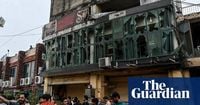New Delhi, India – Tensions between India and Pakistan have escalated dramatically following a series of missile strikes by Indian military forces into Pakistan and Pakistan-administered Kashmir on May 7, 2025. The strikes were framed as a response to a timeline of attacks attributed to Pakistan-based groups, including the 2001 attack on the Indian parliament and the 2008 Mumbai attacks, which collectively resulted in hundreds of casualties. Most recently, a deadly attack in Pahalgam on April 22, 2025, claimed the lives of 26 people, prompting India’s military response.
During a media briefing, Indian Foreign Secretary Vikram Misri emphasized that the missile strikes were intended to “deter and pre-empt” future attacks, accusing Pakistan of harboring terrorist infrastructure. Misri stated, “We have shown restraint for too long, and it is now time for action.” The Indian government has long accused Pakistan of failing to take sufficient measures against armed groups that it claims have been financed and trained by its neighbor over the past four decades.
In retaliation, Pakistan has accused India of escalating tensions, alleging that Indian forces launched drones into its territory on May 8, 2025. The Pakistani military reported that at least 31 people were killed in the Indian missile strikes, which they claimed targeted civilian areas. India, however, has denied targeting civilians and asserted that their strikes were carefully planned to hit specific terror camps.
Military analysts express skepticism about the effectiveness of India’s strikes as a deterrent. Ajai Sahni, executive director of the South Asia Terrorism Portal, remarked, “The Indian strikes have no deterrent value. This is all a domestic theatre.” He argued that the strikes are more about addressing domestic political pressures than achieving significant tactical advantages.
Among the targeted sites was Muridke, near Lahore, identified as the Markaz Taiba camp of Lashkar-e-Taiba (LeT), the group behind the Mumbai attacks. The Indian army also claimed to have hit Bahawalpur, which it alleges is the headquarters of Jaish-e-Muhammad, responsible for a 2019 suicide bombing that killed over 40 Indian paramilitary soldiers.
As the situation unfolded, the Pakistani military claimed to have downed several Indian warplanes involved in the strikes, although Indian officials have not confirmed these reports. Local sources reported that two Indian fighter jets crashed, further complicating the narrative of victory from both sides.
On May 8, the Indian government reported that it had neutralized a Pakistani air defense system located in Lahore as part of its ongoing military operations. Misri defended the strikes, stating, “Our intention has not been to escalate matters; we are responding only to the original escalation.” However, Pakistan’s Defense Minister Khawaja Asif warned that retaliatory strikes from Pakistan are “increasingly becoming certain.”
In response to the heightened tensions, several Indian cities near the border with Pakistan activated blackout sirens, and reports of missile streaks illuminated the night sky. Residents in Jammu reported loud explosions and a complete blackout as the Indian military prepared for potential further conflict.
The situation has also impacted air travel, with numerous flights canceled or rerouted due to the closure of airspace amid the escalating conflict. The US Secretary of State, Marco Rubio, urged both nations to de-escalate the situation in a call with Pakistani Prime Minister Shehbaz Sharif, emphasizing the importance of dialogue.
As the conflict intensifies, Indian authorities have implemented strict security measures at airports across the country, including mandatory secondary security checks and restricted access to terminals. The Bureau of Civil Aviation Security announced these measures to ensure public safety amid fears of further attacks.
Several states, including Punjab and Rajasthan, have also canceled leaves for police personnel and closed schools in border districts as a precautionary measure. The Indian government has emphasized the importance of national security, advising streaming platforms to remove Pakistani content from their services.
Despite the military actions, experts believe that such strikes may not fundamentally alter the long-standing dynamics of conflict between India and Pakistan. “The movement keeps on renewing itself despite India’s countermeasures for three decades,” Sahni noted, suggesting that the cycle of violence may continue unabated.
In the political arena, Indian leaders have rallied behind the military’s actions, framing the strikes as necessary responses to terrorism. Goa Chief Minister Pramod Sawant stated, “Operation Sindoor was not against any country or religion but targeted terrorism.” This sentiment has resonated with many in India, where the government seeks to project strength in the face of perceived threats.
As both nations remain on high alert, the international community watches closely, with calls for restraint coming from various quarters, including China, which urged both countries to avoid actions that could complicate the situation further. The escalating conflict serves as a stark reminder of the fragile peace in the region and the potential for rapid deterioration into wider hostilities.
In summary, the ongoing military exchanges between India and Pakistan highlight the complexities of their relationship, marked by historical grievances, national security concerns, and the ever-present threat of violence. As both sides prepare for potential further escalations, the hope for a peaceful resolution remains tenuous at best.





